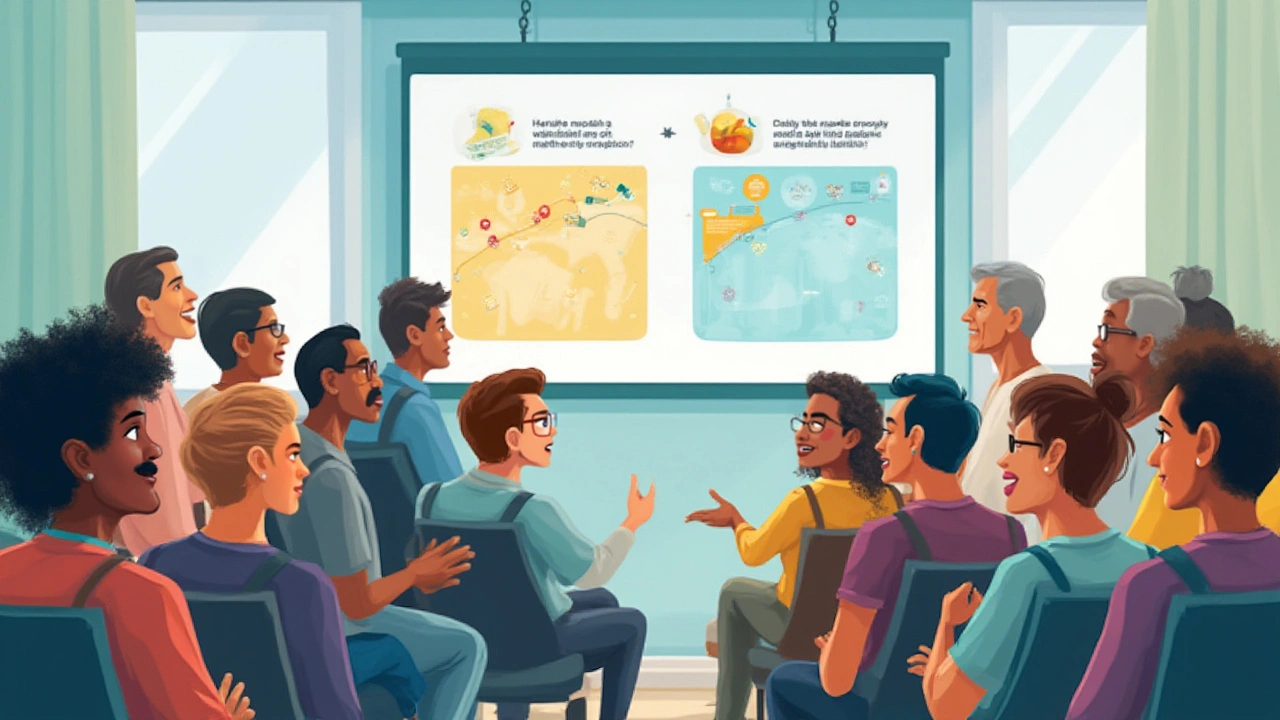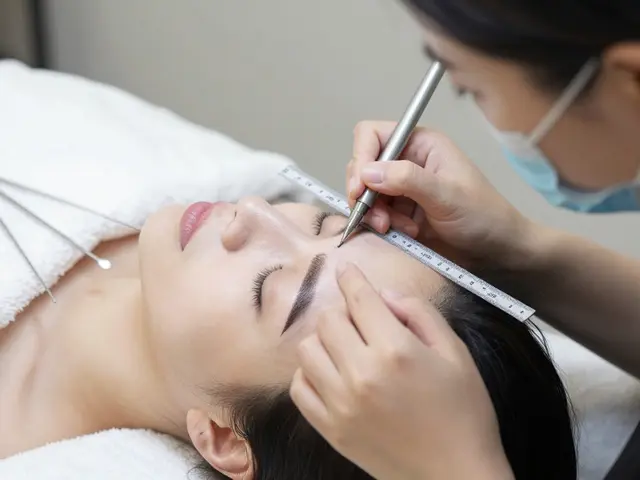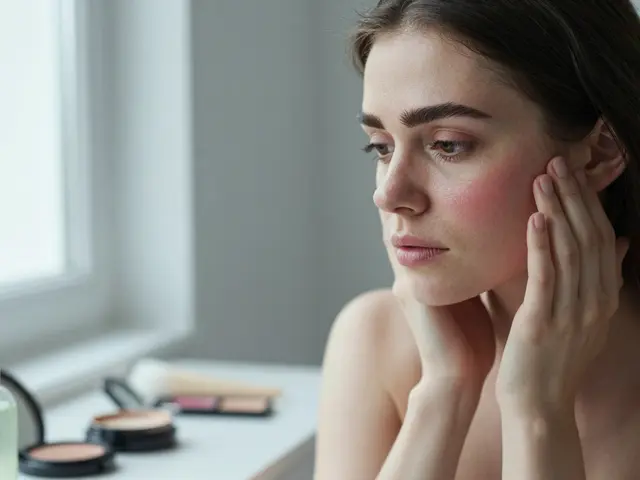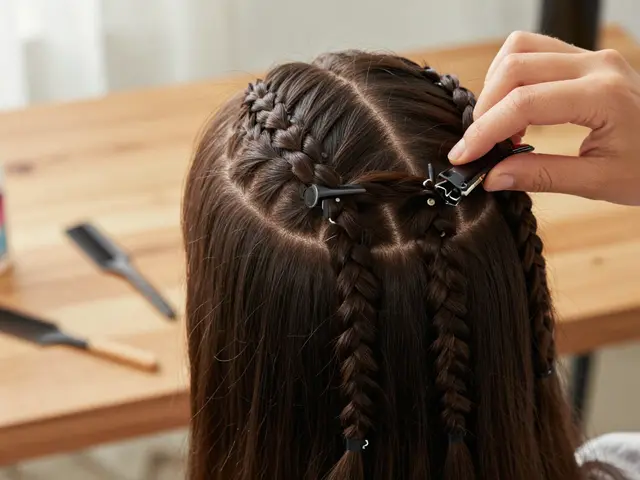Ever wonder why so many people are popping pills for stuff their grandparents just walked off or sweated out at the gym? Pharmaceuticals are everywhere—from morning allergy tablets to “just in case” cholesterol meds. There’s a knee-jerk culture around reaching for a bottle instead of the fruit bowl or running shoes.
But when does medicine really step in as a hero, not a shortcut? Do you need those vitamins, or are you just buying expensive urine? Spotting that line between smart prevention and letting the pharmacy run your life isn’t as easy as it sounds.
Next, we’re going to look at where medicine makes sense and where a few lifestyle swaps can do more for your health (and your wallet) than any prescription ever could.
- Modern Pill Culture: Why We Reach for Meds
- Lifestyle Power: What Clean Living Actually Achieves
- When Pills Are Non-Negotiable
- The Gray Zone: Where Things Get Tricky
- Smart Choices: Finding Your Own Line
Modern Pill Culture: Why We Reach for Meds
It feels like every family kitchen has a growing collection of pill bottles. Got a headache? There’s a pill. Feeling stressed, tired, or can’t sleep? There’s a pill for that too. Americans, for example, filled over 4 billion prescriptions in 2024. That’s more than twelve prescriptions for every person in the country. Europe’s not far behind.
So, what’s fueling this crazy demand? Part of it is clever marketing. Ads for medications play nonstop, promising we’ll “feel our best” if we just add one more tablet to our daily routine. You see these everywhere—TV, online, even at the bus stop. Another factor is sheer convenience. Changing habits takes time and effort, but swallowing a pharmaceutical takes seconds. There’s also a belief that science can fix almost anything, faster than, say, eating better or moving your body more.
Then there’s the pressure from social circles. If your buddy drops 30 pounds using a prescription, it feels natural to wonder if you’re missing out by sticking with morning jogs and salads. One study from the Harvard Medical School showed that more than half of patients who asked their doctor for a specific drug (thanks to commercials they saw) ended up getting it prescribed—even if lifestyle advice would have worked as well.
“Direct-to-consumer advertising tells patients there’s a pill for every problem, and doctors are sometimes too busy to push back,” says Dr. John LaPuma, clinical director at Chef Clinic.
It’s not just over-the-counter stuff, either. People turn to prescription meds for things that, decades ago, weren’t even considered illnesses—think mild anxiety, trouble sleeping, a little hair loss. The line between medical need and marketing-driven desire gets blurry pretty fast.
All this makes for a culture that often leans on medication as a first, not last, resort. There’s real risk in that, from side effects to the cost of a medicine cabinet that could double as a small pharmacy. Next, let’s look at what a healthy lifestyle can actually do—if you give it a real shot before reaching for another refill.
Lifestyle Power: What Clean Living Actually Achieves
If there’s any “magic pill” people are missing, it’s actually just good old clean living. Regular exercise—think even brisk walking for 30 minutes a day—cuts your risk of heart disease and type 2 diabetes in half. Not a fan of running? Just move. Studies out of Harvard showed that even moderate activity lowers blood pressure and cholesterol way better than most folks expect, sometimes matching the effects of common medications.
Your plate makes a difference, too. Upping veggies, fiber, and healthy fats (like olive oil or avocados) slashes your risk for chronic problems. Fact: the Mediterranean diet isn’t just a buzzword, it actually lowers the odds of having a stroke or heart attack—there’s real research with thousands of people behind it.
Sleep gets glossed over but skimping on it drives up your blood sugar and stress, messes with your mood, and wrecks your immune system. Just getting seven to eight hours helps everything from your memory to your skin. You can’t beat that with any supplement.
What’s cool is that all these changes add up. No, it’s not instant. But drop 5–10% of your body weight if you’re overweight, and doctors say you’ll lower your risk for high blood pressure, joint problems, and yep, the need for a cabinet full of medications.
- Prioritize real food over packaged snacks.
- Move your body daily, even if it’s just walking or taking the stairs.
- Chase regular, restful sleep as hard as you chase deadlines.
So, before you go after another prescription or over-the-counter “solution,” see if clean living can tip the scale. Sometimes, it really does work better than what’s in the pharmacy aisle, especially when it comes to a healthy lifestyle.

When Pills Are Non-Negotiable
So here’s the straight talk: sometimes, skipping medication is not an option. If you’ve got insulin-dependent diabetes, high blood pressure that lifestyle alone won’t fix, or a diagnosed mental health disorder like severe depression, medication can literally keep you alive. Doctors aren’t just guessing—they follow strict guidelines, looking at your results and risks before pulling out the prescription pad.
Think about heart disease. Harvard studies show certain heart medications can cut future attack risk in half. Same goes for antibiotics when you’ve got a raging infection—refusing meds can lead to stuff nobody wants to deal with, like sepsis or long-term damage.
Sometimes, the “just live healthy” crowd forgets there are real numbers behind this. Check out the stats in this table to see how much impact the right medication can have:
| Condition | Lifestyle Alone Success Rate | Medication Added Success Rate |
|---|---|---|
| High Blood Pressure | Up to 40% | 80%+ |
| Type 1 Diabetes | 0% | 90%+ (with insulin) |
| Major Depressive Disorder | 20-30% | 50-70% |
No amount of kale smoothies will replace insulin for a type 1 diabetic, or instantly break a stubborn infection. Plus, new meds hit the market every year, improving survival rates and quality of life for all sorts of conditions. Want to dig deeper? The Pharmacy blog is packed with info on how modern meds really work.
The bottom line? When your body really needs it, pharmaceuticals aren’t a crutch—they’re a lifeline. Listen to your doctor, check the data, and don’t buy into the idea that ‘natural’ always means better.
The Gray Zone: Where Things Get Tricky
So, you’re not deathly ill, but you’re not feeling your best. Maybe your blood pressure is borderline, or you’ve got slightly elevated cholesterol. This is where things can get messy. Docs love guidelines, but real people never fit perfectly inside the lines. That’s where the debate between lifestyle and pharmaceuticals hits hardest.
Here’s the deal: sometimes the numbers alone don’t mean you need a prescription. Like, the American College of Cardiology says that if your LDL cholesterol is just above normal, a healthy diet and some exercise might fix it. But if you’ve got a bunch of risk factors—smoking, family history, overweight—you could still end up on statins even if your numbers look decent.
The gray zone is all about context. For example, in the U.S., up to 35% of adults are prescribed medications that treat high blood pressure, but about half could manage with just lifestyle changes, according to the CDC. Still, staying on track with exercise and healthy eating is tough for most people. If you have a family history or a past heart attack, it’s a totally different conversation with your doctor than if you’re just a little out of shape.
| Condition | Lifestyle May Work | Medication Often Needed |
|---|---|---|
| High Blood Pressure | Yes—for mild/high-normal | Yes—if over 140/90 or with risk factors |
| Type 2 Diabetes | Yes—for prediabetes/early stage | Yes—if A1C is above 7% |
| Cholesterol | Yes—if slightly elevated | Yes—if much higher or history of heart disease |
The bottom line? It’s rarely as simple as “just eat better” or “just take this pill.” Sometimes you need both, at least for a while. Your job is to ask questions, look at your whole health picture, and not let anyone—doctor or internet guru—rush you into one lane without explaining the options.

Smart Choices: Finding Your Own Line
So, how do you figure out where you draw the line between a prescription and a lifestyle shake-up? There isn’t a magic formula. But here’s what actually helps: know your body, trust real numbers, and use common sense—no slick marketing or internet trends required.
A lot of doctors now agree that lifestyle changes matter more for most chronic conditions than just taking another pill. The Centers for Disease Control and Prevention reports that 6 in 10 adults in the U.S. have a chronic disease, but up to 80% of heart disease and stroke cases could be prevented with healthy habits like eating better and moving more. You can’t find that in a bottle.
Being smart about pharmaceuticals means knowing exactly when they’re truly necessary and when you’re better off with some real changes. Here’s how you can start making solid choices for yourself, without getting lost in either extreme:
- Get the full picture: Don’t just go off symptoms. Ask for bloodwork or screenings. Your numbers tell the real story.
- Ask your doctor the tough questions: Do I really need this medication long-term, or is it a stopgap until healthier habits kick in?
- Start with realistic lifestyle tweaks: If you smoke or eat mostly takeout, handle those first—prescriptions aren’t magic erasers.
- Track your own progress: Small wins count. Bring up your results at check-ups so you know if you actually need that daily med, or if your new routine is doing the trick.
People often overestimate what medicine can do while underestimating the power of living well. Check out the numbers below comparing lifestyle and meds for common health issues:
| Condition | % Disease Lowered By Lifestyle | % Disease Lowered By Meds |
|---|---|---|
| Type 2 Diabetes | 58% (with diet/exercise) | 30-40% (metformin alone) |
| High Blood Pressure | Up to 50% (with good habits) | 50-60% (meds) |
| High Cholesterol | 20-30% (diet/exercise) | 30-50% (statins) |
Find your own sweet spot by being honest with yourself and your doctor. Your real edge isn’t just a script, it’s the stuff you do every single day.







Ian Cassidy
July 17, 2025 AT 22:23Honestly, the balance between pharmaceuticals and a healthy lifestyle is a nuanced thing. You can't just say, "live healthy and skip meds," especially if you have chronic conditions. Medications can manage symptoms or prevent worsening, but if you're not laying a foundation of diet, exercise, and mental well-being, you're missing half the equation. It's like trying to patch roof leaks with duct tape instead of fixing the roof itself.
That said, pharma has its downsides, like side effects, dependency, and sometimes overtreatment. So, natural prevention and lifestyle changes should always be the first line of defense. You want to delay or reduce the need for meds as much as possible.
Anyone here have experience balancing the two? What are real-world tips you’ve found to bridge this gap effectively?
Peter Reynolds
July 20, 2025 AT 06:13Good points. I think it really depends on individual circumstances and conditions. For example, if someone has diabetes, healthy lifestyle alone might not suffice to keep up sugar levels in control. Medications help maintain balance but pairing them with diet control and exercise is crucial.
What worries me sometimes is the tendency to rely too heavily on pills and ignore lifestyle modifications. That said, some conditions genuinely require ongoing pharmaceutical support, and nobody should be shamed for that.
Balance and moderation in approach seem to be the key.
Sarah McWhirter
July 22, 2025 AT 14:03Oh sure, the pharmaceutical industry loves to push those pills like there isn't an alternative. Don't get me started on how much profit they make by convincing you to stay medicated forever!
They highlight "balance" but what they really mean is "take our meds, and maybe try some kale on the side." Ever think they just want us dependent so they can keep cashing checks?
Personally? I'd rather fight for lifestyle changes and natural healing methods before swallowing another pill, but I'm prepared for the industry to call me a conspiracy nut for saying that.
Anyone else suspicious of big pharma's motives here?
Ananya Sharma
July 26, 2025 AT 01:56Honestly, the prevalent glorification of pharmaceuticals over sustainable health choices is infuriating. People live in a delusion that popping pills solves problems while their 'healthy lifestyle' is just a tired excuse for complacency.
One cannot discount the validity of medications in some cases, but the fetishization of pharma solutions without holding individuals accountable for their choices is a manifestation of moral weakness.
The real line is clear if you dare to look—medications are for real emergencies and critical support, while prevention through lifestyle is a non-negotiable obligation. Anything else is pandering to laziness or ignorance.
kelvin kind
July 27, 2025 AT 06:00All these points make sense although sometimes it’s not easy to clearly decide where one ends and the other begins. I’ve noticed that a lot of folks struggle to commit fully to lifestyle changes unless they hit a health scare, then meds become a must.
To me, it feels like building good habits early on is the real challenge, but the healthcare system often only reacts once something has gone wrong.
The "balance" is probably more about system-level support for prevention alongside necessary treatments, instead of either/or for the individual.
Fred Edwords
July 29, 2025 AT 16:40Indeed, striking a balance between pharmaceuticals and lifestyle choices is paramount for effective health management. Medications serve as critical tools for acute and chronic conditions; however, their efficacy is amplified tremendously when coupled with thoughtful preventive measures such as balanced nutrition, regular physical activity, and stress management.
Medical professionals increasingly advocate for integrative approaches to healthcare, recognizing that neither zero medications nor exclusive pharmaceutical reliance is ideal. The question remains: How do we personalize this balance optimally for diverse populations?
Looking forward to hearing expert opinions and anecdotal wisdom alike!
Antonio Hunter
August 2, 2025 AT 04:20I want to add that this isn't just a medical or lifestyle question but a social one. Access to healthy food, safe environments for exercise, education, and healthcare all influence what balance people can realistically achieve.
For many, medications are not about choice but a necessity due to their living conditions or genetic predispositions. We should be empathetic and supportive rather than judgmental.
Perhaps the real line is drawn where intention meets opportunity—when people have the tools and knowledge to integrate prevention and treatment without fear or stigma.
And that’s a societal issue as much as a personal one.
Paritosh Bhagat
August 6, 2025 AT 19:40Frankly, I’m tired of people simplifying this like it’s just lifestyle or pills. That’s rarely the case in real situations. Many times, people adhere perfectly to a healthy lifestyle and still end up requiring pharmaceuticals due to their genetics or environment.
The problem arises when the healthcare system prioritizes profit over individualized care, pushing pills as first-line solutions without adequately supporting lifestyle changes through community programs or counseling.
We need a revolutionary approach that respects both the hard science behind medications and the undeniable benefits of prevention through healthier living. Until then, the line remains blurred and confusing for millions trying to navigate it.
Kenny Stockman
August 10, 2025 AT 07:10Hey folks, just jumping in here to say this is a great discussion with valuable perspectives from everyone. As someone who’s coached people through health transformations, the synergy between meds and lifestyle can’t be overstated.
My take is: meds can stabilize and even save lives, but sustainable well-being almost always demands lifestyle adaptations. People often underestimate how powerful small consistent changes—like improving sleep or adjusting diet—are in easing medication dependence.
It’s not about rejecting meds or romanticizing lifestyle alone; it’s about empowerment to make choices that fit each individual’s unique story.
Zach Beggs
August 14, 2025 AT 22:23All thoughtful points here. To me, the 'real line' is dynamic rather than fixed. People’s health states, environments, and priorities change. What works as a primary strategy today might shift tomorrow.
I appreciate the emphasis on balance and avoiding over-reliance on pharmaceuticals, but also recognize their vital role when lifestyle changes alone fall short.
Ultimately, it's a collaborative journey between patient, healthcare providers, and community resources to find that sweet spot for each individual.